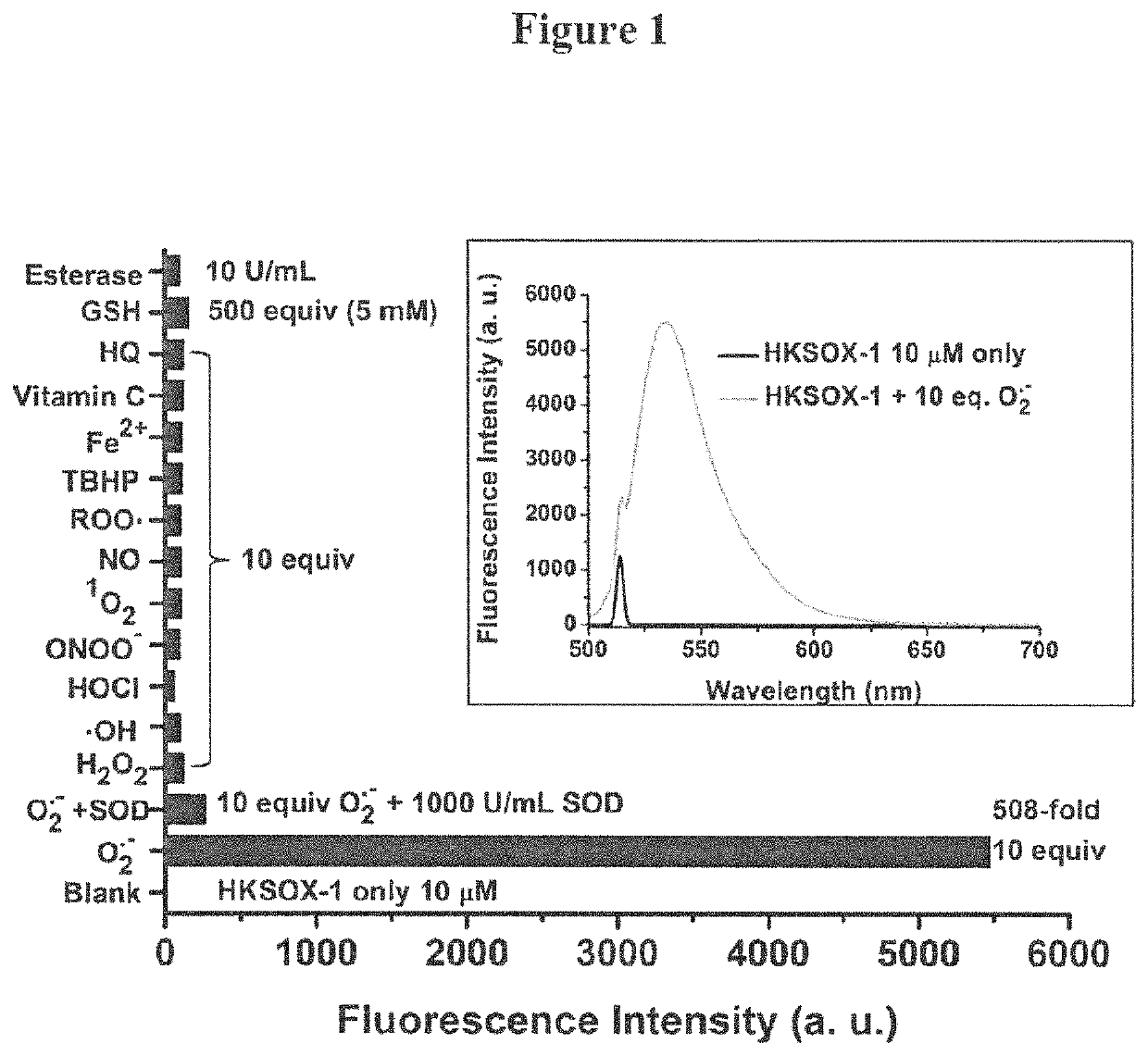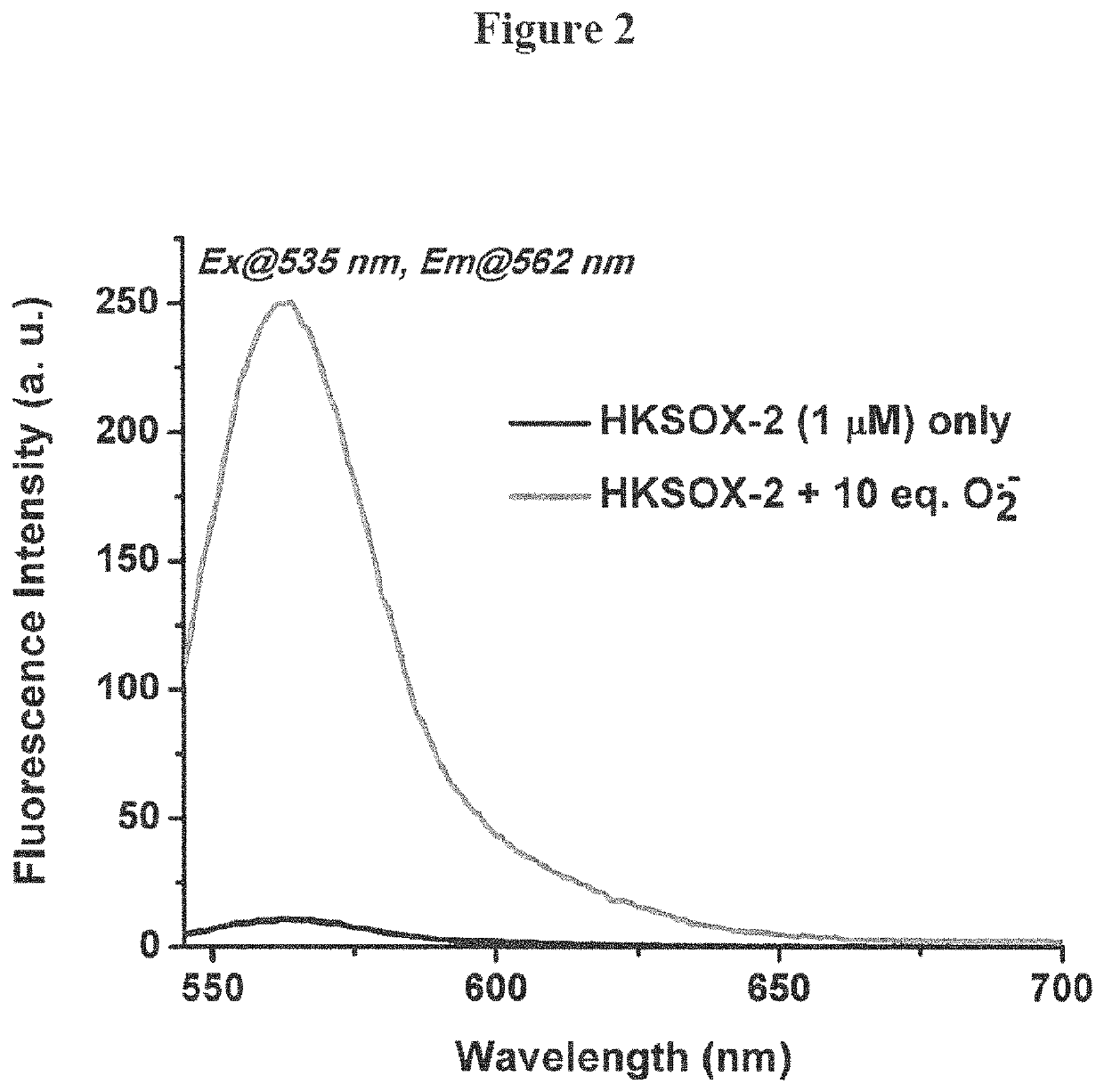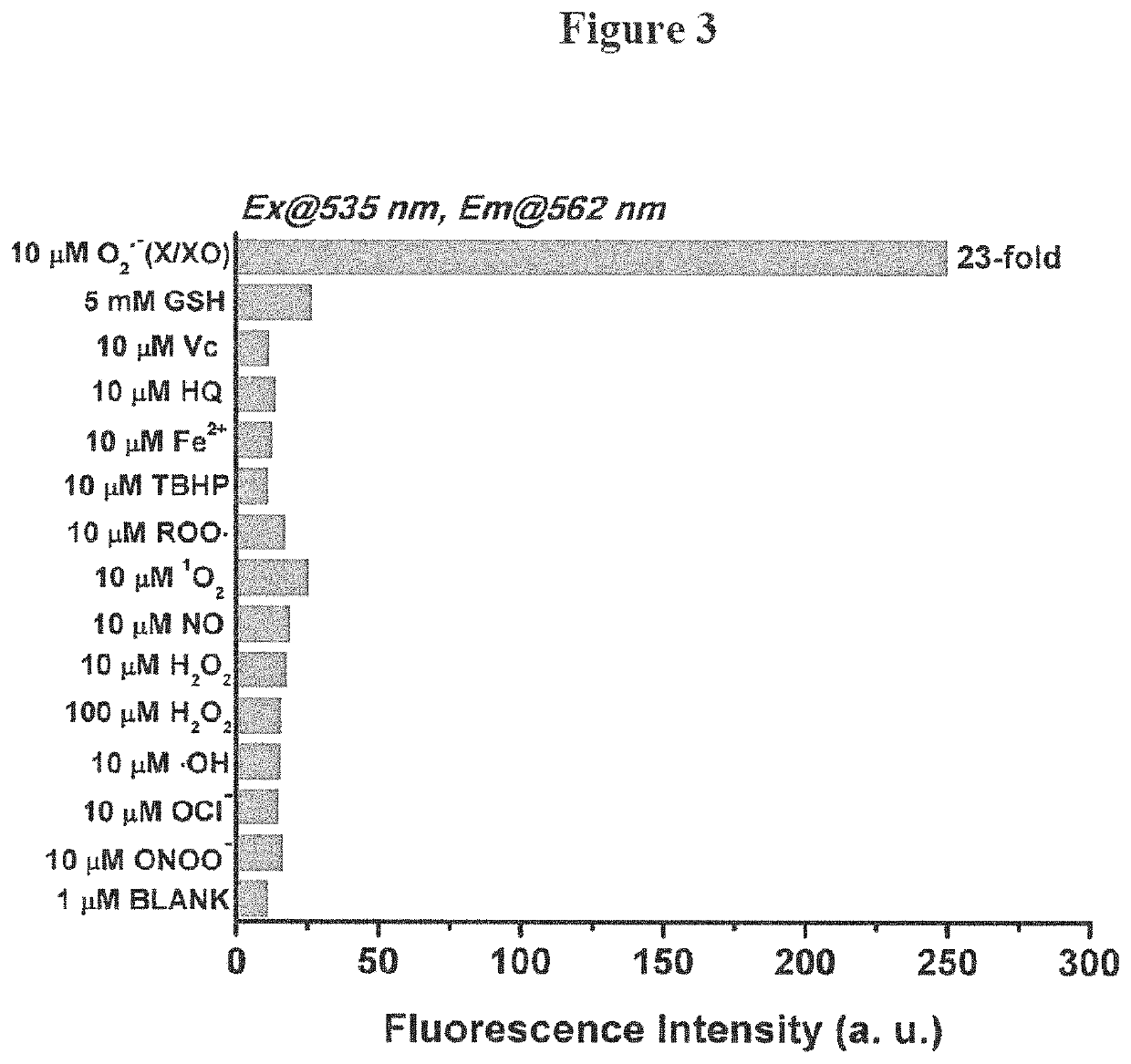Bistrifilate-based fluorogenic probes for detection of superoxide anion radical
a fluorogenic probe and superoxide anion radical technology, applied in the field of bistrifilate-based fluorogenic probes for detection of superoxide anion radicals, can solve the problems of limited sensitivity and selectivity of current superoxide probes
- Summary
- Abstract
- Description
- Claims
- Application Information
AI Technical Summary
Benefits of technology
Problems solved by technology
Method used
Image
Examples
example 1
of Green Fluorogenic Compounds HKSOX-1 and HKSOX-1r
[0091]
[0092]To a solution of 5-carboxy-2′,4′,5′,7′-tetrafluorofluorescein (220 mg, 049 mmol) in anhydrous pyridine (5 mL) and dry DCM (5 mL) at −78° C. was added Tf2O (246 μL, 1.47 mmol) dropwise under argon atmosphere. The resulting mixture was stirred at −78° C. for 10 min and then at room temperature for another 10 min. Then the reaction was quenched with saturated NaHCO3 aqueous solution at room temperature. The mixture was diluted with ethyl acetate (50 mL) and washed with 1N HCl, water and brine. The organic layer was dried over anhydrous magnesium sulfate and concentrated in vacuo. The target compound HKSOX-1 was isolated by flash chromatography on silica gel, using MeOH:DCM (1:9) as the eluent. Yield 143 mg (41%). 1H NMR (400 MHz, CDCl3) δ 8.67 (s, 1H), 8.43 (d, J=8.0 Hz, 1H), 7.52 (d, J=8.0 Hz, 1H), 7.06 (s, 1H), 7.03 (s, 1H); 13C NMR (150 MHz, CDCl3) δ 168.68, 167.74, 155.80, 152.89, 151.22, 146.50, 144.77, 138.45, 133.23,...
example 2
of Yellow Fluorogenic Compound HKSOX-2
[0097]
[0098]The mixture of 2,4-difluororesorcinol (925 mg, 6.33 mmol) and phthalic anhydride (469 mg, 3.17 mmol) was prepared in MeSO3H (10 mL) at room temperature under argon atmosphere. The resulting mixture was stirred at 120° C. for 2 hrs. The reaction mixture was allowed to cool to room temperature and diluted with water (100 mL). The mixture was extracted with EtOAc and washed with 1N HCl water and brine. The organic layer was dried over anhydrous magnesium sulfate and concentrated in vacuo. The target compound HJ-3-164 was isolated by flash chromatography on silica gel using EtOAc:Hexane (3:7) (with 0.25% AcOH). Yield: 580 mg (45%). 1H NMR (400 MHz, CDCl3) δ 8.06 (d, J=7.6 Hz, 1H), 7.81 (dt, J=7.5, 3.8 Hz, 1H), 7.74 (t, J=7.2 Hz, 1H), 7.28 (d, J=7.6 Hz, 1H), 6.29 (d, J=1.7 Hz, 1H), 6.26 (d, J=1.7 Hz, 1H); 13C NMR (100 MHz, CDCl3) δ 173.94, 169.07, 149.80, 149.76, 147.40, 147.37, 141.99, 141.93, 139.54, 139.48, 137.26, 137.17, 135.44, 130....
example 3
of Mitochondria-Targeted Green Fluorogenic Compound HKSOX-1m
[0105]
[0106]1) To a mixture of trimellitic anhydride (175 mg, 0.912 mmol), 2,4-difluororesorcinol (266 mg, 1.824 mmol) was added MeSO3H (3 mL) under argon atmosphere. The resulting mixture was heated to 120° C. for 2 h, then cooled to room temperature, and quenched with water. The red solid precipitate was collected by filtration, washed by water, and dried over air to afford 5(6)-carboxy-2′,4′,5′,7′-tetrafluorofluorescein as red solid.
[0107]2) To a solution of 5(6)-carboxy-2′,4′,5′,7′-tetrafluorofluorescein (198 mg, 0.443 mmol) in dry DCM (2 mL), DIPEA (0.366 mL, 2.22 mmol) was added under argon atmosphere. Then chloromethyl methyl ether (0.168 mL, 2.22 mmol) was added dropwise. The resulting mixture was stirred 12 h at room temperature, and then diluted with ethyl acetate, washed by 1N HCl, water, and brine. The organic layer was dried over MgSO4, and concentrated in vacuo. The methoxymethyl protected product was isolated...
PUM
 Login to View More
Login to View More Abstract
Description
Claims
Application Information
 Login to View More
Login to View More - R&D
- Intellectual Property
- Life Sciences
- Materials
- Tech Scout
- Unparalleled Data Quality
- Higher Quality Content
- 60% Fewer Hallucinations
Browse by: Latest US Patents, China's latest patents, Technical Efficacy Thesaurus, Application Domain, Technology Topic, Popular Technical Reports.
© 2025 PatSnap. All rights reserved.Legal|Privacy policy|Modern Slavery Act Transparency Statement|Sitemap|About US| Contact US: help@patsnap.com



